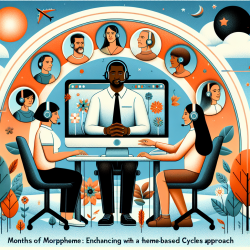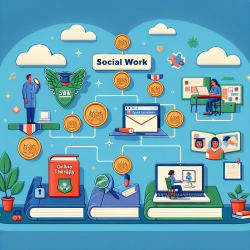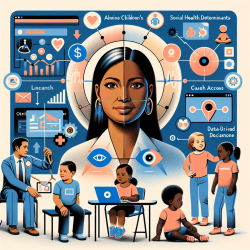Introduction
The COVID-19 pandemic has been a challenging time for everyone, especially for healthcare professionals. A recent pilot study titled "Burnout and Sources of Stress Among Health Care Risk Managers and Patient Safety Personnel During the COVID-19 Pandemic" sheds light on the extent of burnout and stress experienced by healthcare risk managers and patient safety personnel. As a practitioner, understanding these findings can help you improve your skills and resilience, ultimately leading to better outcomes for the children and communities you serve.
Understanding Burnout and Stress
The study utilized the Oldenburg Burnout Inventory (OLBI) to measure burnout levels among participants. The results were alarming, with over 70% of participants qualifying as burned out. Key stressors identified included:
- Social distancing and lack of personal interaction
- Changing duties and increased workload
- Fear of infection and its impacts on family and self
- Financial concerns
These stressors highlight the multifaceted challenges faced by healthcare professionals during the pandemic.
Improving Skills and Resilience
As a practitioner, there are several strategies you can implement to manage stress and prevent burnout:
- Enhance Communication: Foster open communication with peers and managers to mitigate the effects of social distancing. Regular check-ins and virtual meetings can help maintain strong work relationships.
- Time Management: Prioritize tasks and set realistic goals to manage changing duties and workload effectively. Consider using digital tools to streamline processes.
- Self-Care: Engage in activities that promote well-being, such as exercise, meditation, and hobbies. Encourage your team to do the same to build a supportive environment.
- Seek Support: Utilize peer support programs or counseling services to address emotional and psychological needs. Sharing experiences with colleagues can provide valuable insights and relief.
Encouraging Further Research
While this pilot study provides important insights, further research is needed to fully understand the prevalence and impact of burnout in healthcare risk management and patient safety personnel. As a practitioner, consider contributing to or initiating research efforts to explore these issues in greater depth. By doing so, you can help develop targeted interventions that address the unique challenges faced by your profession.
Conclusion
Burnout and stress are significant issues in the healthcare sector, particularly during the COVID-19 pandemic. By understanding the findings of this study and implementing strategies to manage stress, you can enhance your skills and resilience. This not only benefits you but also the children and communities you serve. To read the original research paper, please follow this link: Burnout and Sources of Stress Among Health Care Risk Managers and Patient Safety Personnel During the COVID-19 Pandemic: A Pilot Study.










